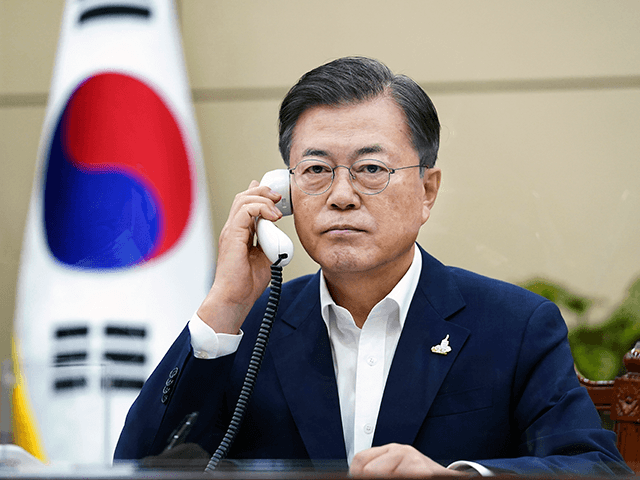South Korean President Moon Jae-in held a 14-minute telephone conversation with presumptive incoming U.S. president Joe Biden on Thursday to discuss U.S. policy for the Indo-Pacific region, denuclearization of the Korean peninsula, and the coronavirus pandemic.
According to South Korea’s presidential Blue House, Moon said he would meet in person with Biden “at an early date after Biden’s inauguration.”
Yonhap News summarized the description of the phone call provided by Cheong Wa Dae or the “Blue House,” South Korea’s version of the White House:
Biden described South Korea as a “linchpin” of security and prosperity in the Indo-Pacific region, according to Moon’s spokesman Kang Min-seok.
Moon asked Biden to “communicate closely” for the forward-looking development of the Seoul-Washington alliance, denuclearization of the Korean Peninsula and establishment of lasting peace here.
The president cited the allies’ 70 years of partnership for the protection of such shared values as democracy and human rights, Kang said.
Biden promised to “closely cooperate” with Moon on North Korea’s nuclear weapons and maintain the U.S. commitment to South Korean security. Biden and Moon agreed to work together on global issues such as the coronavirus and climate change.
The coronavirus pandemic was initially horrendous in South Korea, but the South Korean response was later seen as one of the most improved in the world, in part through widespread and rather intrusive virus testing.
Moon discussed his conversation with Biden on Twitter:
A Blue House official told Yonhap News that one sensitive subject was not discussed during the phone call: South Korea’s fraught relations with Japan. The two countries are locked in a bitter feud over Imperial Japan’s use of forced labor during its World War II occupation of South Korea. The diplomatic and economic standoff has escalated several times since 2018 when a South Korean Supreme Court decision on compensation for forced labor enraged the Japanese.
Hopes that Japan’s recent change in prime ministers might break the diplomatic ice have not yet been realized, with new Prime Minister Suga Yoshihide stating that he wants to improve relations with Seoul, but will not budge from positions taken by his predecessor Abe Shinzo.
Yonhap’s source also said Moon and Biden did not discuss South Korean Trade Minister Yoo Myung-hee’s effort to become Director-General of the World Trade Organization (WTO). Yoo, the first female trade minister from South Korea, is running against former finance minister Ngozi Okonjo-Iweala of Nigeria, who is also a woman and supported by Japan.
Moon has been highly supportive of Yoo’s bid for the position. Yoo promises that one of her top priorities as head of the WTO would be mediating trade disputes between the United States and China.
The call between Moon and Biden included at least a cursory discussion of the situation with North Korea. Biden reportedly said the U.S. will “continue to firmly maintain our defense commitment to South Korea and cooperate closely to resolve the North Korean nuclear issue.” Moon said he would support continuing efforts to denuclearize the Korean peninsula.
UPI quoted the Blue House saying that Moon congratulated Biden on an election victory that reflected Biden’s “long experience in government affairs, outstanding leadership and the high expectations of the American people for a clear vision.”
Writing at the Diplomat on Monday, Seoul-based journalist Morten Soendergaard Larsen sized up a Biden presidency as a “good news, bad news” situation for Moon. Larsen noted that Biden enjoys 59 percent favorability among South Koreans compared to Trump’s 16 percent, an opinion shaped by Trump’s confrontations with Seoul over the cost of housing American troops in Korea.
On the other hand, Larsen quoted analysts who thought Biden would likely return to the disengaged North Korean policy of the Obama administration while focusing on other foreign policy priorities. This could prove frustrating for Moon since his presidency is largely focused on improving relations with the North.
For all the fireworks over President Trump’s diplomacy with North Korea and its ostensible collapse after the second meeting between Trump and dictator Kim Jong-un, all the provocative statements and actions made by Pyongyang since then, and all the U.S. media furor over Trump’s chummy correspondence with Kim, North Korea’s behavior was considerably more malevolent and intransigent the last time Joe Biden was in the White House.

COMMENTS
Please let us know if you're having issues with commenting.